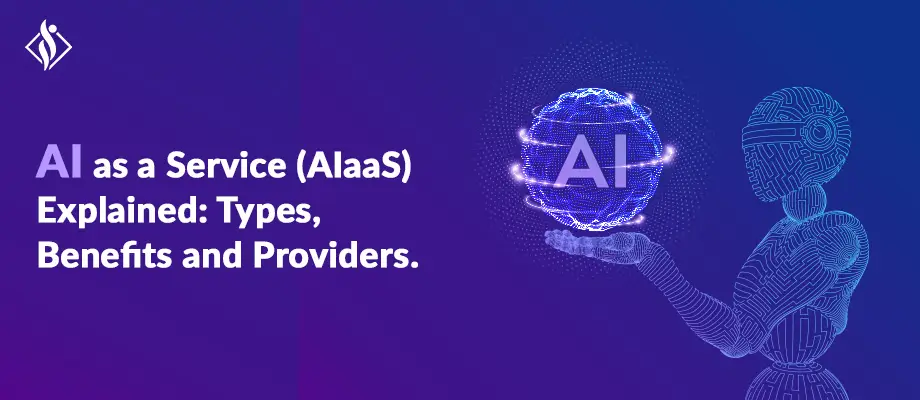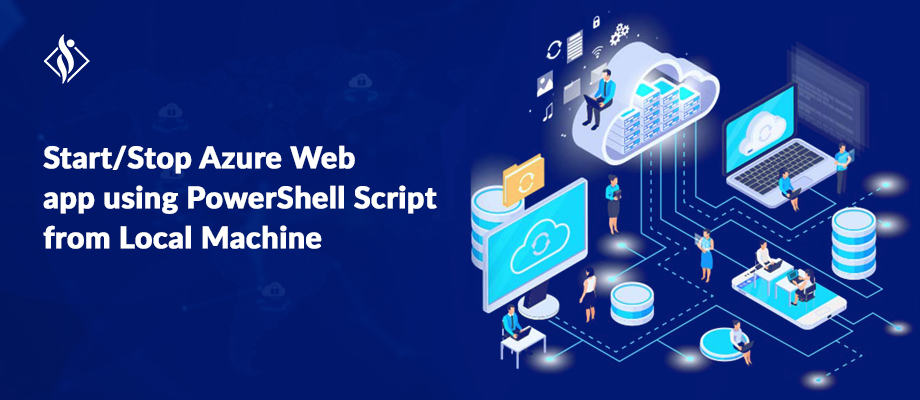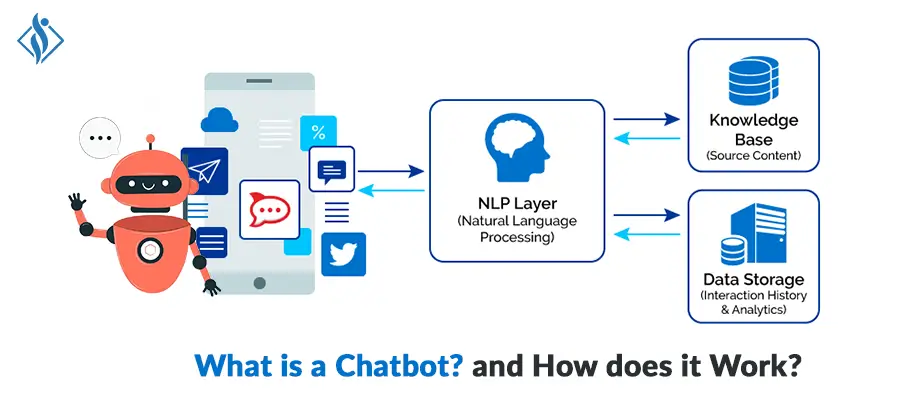Home » Artificial Intelligence » AI as a Service (AIaaS): Discover Types, Benefits, and Top Providers
AI as a Service (AIaaS): Discover Types, Benefits, and Top Providers

Artificial intelligence (AI) is a wide and ever-changing technology. As businesses increasingly turn to AI to optimize operations and enhance user experiences, the concept of AI as a Service (AIaaS) has emerged as a game-changer. Let’s take a closer look at the various types of AIaaS offerings that are shaping the future of technology.
What is AI as a Service (AIaaS)?
AI as a Service, often abbreviated as AIaaS, refers to the provision of artificial intelligence (AI) capabilities via cloud-based platforms. Instead of companies investing in their own infrastructure and tools to develop AI solutions, they can now leverage AIaaS platforms to access, implement, and benefit from AI without the hefty upfront costs.

According to NMSC, the global explainable artificial intelligence (XAI) market was valued at five-point-one billion U.S. dollars in 2022. By 2030, the market is forecast to have a value of over 24 billion U.S. dollars.
4 Types of AI as a Service (AIaaS)
AIaaS offers a range of AI tools and solutions that can be accessed via cloud platforms, eliminating the need for on-premises infrastructure. Let’s delve deeper into the various types of AIaaS to understand their functionalities and applications.
1. Bots and Virtual Agents
Bots and digital assistants are AI-driven software entities designed to interact with users, answer queries, and perform specific tasks. They can simulate human conversation and are often used in customer service, e-commerce, and personal assistance.
Where it use:
- Customer Support: Chatbots can handle customer queries, provide information, and even troubleshoot issues.
- Virtual Personal Assistants: Siri, Alexa, and Google Assistant help users with tasks like setting reminders, playing music, or checking the weather.
- E-commerce: Bots assist in product recommendations and streamline the shopping process.
2. Application Programming Interface (APIs)
APIs are sets of rules and protocols that allow different software applications to communicate with each other. AI APIs enable developers to integrate AI capabilities, such as image recognition or language processing, into their applications without building the AI models from scratch.
Where it use:
- Image and Video Analysis: APIs can identify objects, detect faces, or even analyze emotions in media content.
- Natural Language Processing: APIs can translate languages, convert speech to text, or analyze sentiment in textual data.
- Predictive Analytics: Use AI APIs to forecast trends based on historical data.
3. Machine Learning (ML) Frameworks
ML frameworks are comprehensive libraries that facilitate the design, training, and deployment of machine learning models. They provide pre-defined functions and structures, making it easier for developers to work with complex algorithms.
Where it use:
- Data Analysis: Frameworks can process and analyze vast amounts of data to extract meaningful insights.
- Predictive Modeling: Businesses can forecast sales, user behavior, or market trends using ML frameworks.
- Image and Voice Recognition: Frameworks can be used to develop models that recognize patterns in images or voice commands.
4. No-Code or Low-Code ML Services
These platforms are designed for individuals who may not have extensive coding expertise. They offer a more visual approach to AI solution development, allowing users to create, train, and deploy AI models using drag-and-drop interfaces and pre-built templates.
Where it use:
- Rapid Prototyping: Businesses can quickly develop and test AI solutions without extensive coding.
- Data Analysis: Users can analyze data, create visualizations, and generate reports without writing complex algorithms.
- Custom Solutions: Even without a deep technical background, users can develop tailored AI solutions for specific business needs.
Top AI as a Service Companies
AI (Artificial Intelligence) is growing fast. Many companies worldwide are using it to improve their business. Big tech companies are leading the way by offering AI services. Let’s look closer at what these top companies offer.
1. Microsoft Azure
Azure cloud computing service, has been at the forefront of integrating AI solutions into its platform.
- Azure Bot Service: This service allows developers to build, test, and deploy conversational AI bots. These bots can be integrated into websites, apps, and popular channels like Facebook Messenger or Slack, enhancing user engagement.
- Azure Cognitive Search: A fully managed search service, it uses AI to provide more relevant search results, making content discovery seamless for users.
- Azure Cognitive Services: This suite offers a range of services from vision and speech to language processing. For instance, its ‘Face API’ can detect and recognize human faces in images, while the ‘Text Analytics API’ can gauge sentiment, extract key phrases, and more.
- Azure Machine Learning: A comprehensive service that facilitates building, training, and deploying machine learning models. It supports open-source technologies, ensuring flexibility and efficiency.
2. AWS (Amazon Web Services)
AWS has been a dominant player in the cloud computing space, and its AI offerings are no exception.
- Lex: An integral part of Amazon’s AI suite, Lex powers the famous Alexa. It facilitates building conversational interfaces into any application using voice and text.
- Sagemaker: This fully managed service empowers developers to build, train, and deploy machine learning models. Its highlight is the ease of use, allowing developers to start from pre-existing models rather than building from scratch.
- Polly: Polly turns text into lifelike speech, allowing developers to create applications that can talk. It supports multiple languages and boasts a wide range of lifelike voices.
- Rekognition: This service analyzes images and videos, detecting objects, scenes, and faces. It can also identify inappropriate content and even recognize celebrities.
3. Google Cloud
Google Cloud is synonymous with innovation, and its AI services are a testament to its commitment to leading the AI revolution.
- AI Platform: This end-to-end platform is designed for building, deploying, and managing AI projects. It supports custom model building and offers pre-trained models for immediate use.
- AI Hub: A one-stop destination for AI components, the AI Hub facilitates collaboration by allowing teams to store, discover, and reuse pipelines and models.
- AI Conversation: This service is all about building interactive conversational agents. Whether it’s chatbots or voice-based applications, AI Conversation ensures natural and engaging interactions.
- AI Language: Designed to process vast amounts of text, this service can analyze content, classify it, and even translate it. It’s a boon for applications that rely heavily on text data.
5 Benefits of AI as a Service
1. Cost-Effective Solutions
- Infrastructure Savings: AIaaS eliminates the need for businesses to invest in expensive hardware and software infrastructure. Instead, they can access state-of-the-art AI tools and solutions on a subscription basis.
- Reduced Development Costs: With pre-built solutions and tools, businesses can cut down on the costs associated with developing AI solutions from scratch.
2. Scalability and Flexibility
- Adaptable Resources: AIaaS platforms can easily adapt to fluctuating workloads, ensuring that businesses only pay for the resources they use.
- Growth Accommodation: As a business grows, AIaaS can scale up to meet increased demands without requiring major changes or new investments.
3. Accessibility and Democratization
- No Expertise Required: Even without a team of AI experts, businesses can leverage advanced AI capabilities. This democratizes access to AI, allowing even small businesses to compete at higher levels.
- Rapid Prototyping: Businesses can quickly test and iterate AI models, speeding up innovation.
4. Continuous Updates and Improvements
- Staying Current: AIaaS providers continuously update their platforms with the latest AI research and improvements, ensuring businesses always have access to cutting-edge technology.
- Security Enhancements: Regular updates also mean that security is continuously enhanced, protecting businesses from emerging threats.
5. Global Reach and Integration
- Cross-border Solutions: AIaaS platforms often come with multi-language support, enabling businesses to deploy solutions globally.
- Seamless Integration: Many AIaaS solutions are designed to integrate seamlessly with existing business applications, reducing friction in implementation.
5 Challenges of AI as a Service
1. Data Privacy and Security Concerns:
- Data Breaches: Storing sensitive data on cloud platforms can expose businesses to data breaches if not properly secured.
- Regulatory Compliance: Different regions have varying data protection regulations. Ensuring compliance when using AIaaS can be challenging.
2. Integration and Compatibility Issues
- Legacy Systems: Older, legacy systems might not be compatible with modern AIaaS solutions, leading to integration challenges.
- Custom Solutions: Businesses with highly customized software might find it difficult to integrate standardized AIaaS tools.
3. Over-reliance on Service Providers
- Vendor Lock-in: Businesses might become too dependent on a single AIaaS provider, making it challenging to switch providers or solutions in the future.
- Downtime Risks: If the AIaaS provider faces technical issues or outages, it can disrupt the business operations of their clients.
4. Ethical and Bias Concerns
- Algorithmic Biases: If not properly trained, AI models can exhibit biases, leading to unfair or discriminatory outcomes.
- Transparency Issues: It can be challenging to understand how certain AI models make decisions, leading to trust issues.
5. Variable Expenses
- Fluctuating Costs: The pay-as-you-go model, while flexible, can lead to unpredictable monthly expenses, especially if the usage of AI services spikes unexpectedly.
- Budgeting Challenges: Without a fixed cost, businesses might find it challenging to allocate a precise budget for AIaaS services.
Future of AI as a Service
The future of AI as a service is promising. As technology continues to evolve, we can expect AIaaS platforms to become more sophisticated, offering a wider range of services. The integration of AI with other emerging technologies like IoT and blockchain will further amplify its potential. In essence, AIaaS is set to revolutionize industries, making artificial intelligence more accessible and actionable for all.
Conclusion
AI as a service emerges as a vibrant thread, weaving together innovation, accessibility, and efficiency. As we stand on the cusp of a new digital dawn, AIaaS promises to democratize the power of artificial intelligence, making it an ally for businesses big and small. It’s not just about algorithms and computations; it’s about crafting a smarter, more connected future for all. AIaaS isn’t just the future; it’s the present, redefining the way we think, work, and innovate. Embrace it, and let’s co-create a world where technology amplifies human potential.
With over 10 years of experience in Tech industry at Samarpan Infotech with architect system, problem solving and creativity. "Today is the only day. Yesterday is gone".



